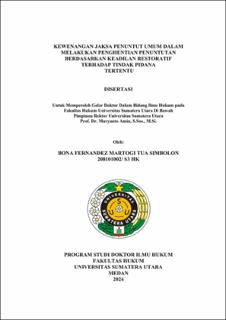Kewenangan Jaksa Penuntut Umum Dalam Melakukan Penghentian Penuntutan Berdasarkan Keadilan Restoratif Terhadap Tindak Pidana Tertentu
Authority of the Public Prosecutor to Discontinue Prosecution Based on Restorative Justice for Certain Criminal Offenses

Date
2024Author
Simbolon, Bona Fernandez Martogi Tua
Advisor(s)
Syahrin, Alvi
Marlina
Danil, Elwi
Metadata
Show full item recordAbstract
Resolving certain criminal acts using a restorative justice approach is currently often used by the community and is an inseparable part of prosecutorial authority. This normative juridical research entitled “Authority of the Prosecution To Discontinue Prosecution Based on Restorative Justice For Certain Criminal Offenses”, discusses issues related to the philosophical basis for the birth of Perja Number 15 of 2020, regulation of the prosecutor's authority in terminating prosecution and its implications for victims, perpetrators, society and the state. Conclusion to the problem: First, the basic philosophy of the birth of Perja Number 15 of 2020 revives living values / local wisdom, a sense of humanity, public and legal interests, proportionality, ultimum remedium, efficiency, handling cases quickly, simple, and light costs for fairness and expediency. Second, regulating the authority of prosecutors to stop prosecutions based on restorative justice in Perja Number 15 of 2020 related to dominus litis, opportunity, discretion, which are regulated in Article 30 C letter d and Article 35 paragraph (1) letter c of the Prosecutor's Law, not only applies to public interests, but also to legal interests. Third, the implications are to realize positive benefits in overcoming the weaknesses of the national legal system and social needs based on Pancasila values. Positive benefits for victims, perpetrators, society, the state, and law enforcement officials, especially public prosecutors, in providing justice, absorb the state's burden, energy, thoughts, time, and reduce the overcapacity of prisoners in prisons. Recommendation: First, public prosecutors are required to explore the living values of justice in handling certain criminal cases. Second, so that the public prosecutor really bases his decision on prosecutorial policy based on public interests and/or legal interests, not because of other irrelevant factors. Third, so that the implementation of Perja Number 15 of 2020 in the future is further strengthened with strict provisions as an obligation, It is not an alternative, especially for light/small cases, by creating standard guidelines for discontinuing prosecution.
Collections
- Doctoral Dissertations [167]
